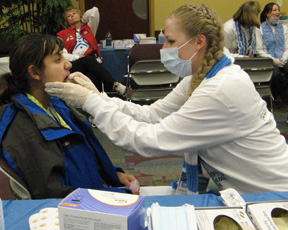Idaho State volunteers provide services to Special Olympics athletes
February 12, 2009
A battalion of Idaho State University dental hygiene students – the entire junior and senior classes – traveled from Pocatello to Boise on Feb. 12 to help deliver oral health services to scores of the 2,500 participants in 2009 Special Olympics World Winter Games.
In all, 52 undergraduate dental hygiene students and nine faculty members from Pocatello joined a dental hygiene faculty member and a graduate student in Boise to deliver oral exams Feb. 12-13.

“I’m very excited about the opportunity,” said M’Lisa Denning, a senior in ISU’s dental hygiene Bachelor of Science program. “It was great for all of the students to go over together. It was a privilege to help out the athletes that came to Idaho from all over the world.”
The ISU dental hygiene contingent joined numerous other volunteers from ISU-Boise and around the state who delivered other services such as hearing screenings and health assessments. These activities were provided through the Special Olympics Healthy Athletes program created in 1996 to focus attention on health issues facing Special Olympics athletes.
“The ISU dental hygiene department and our students were invited to participate with dental health professionals from throughout the state to provide oral health screenings,” said Jacque Freudenthal, assistant professor in the ISU dental hygiene department. “This kind of opportunity only comes around once in a life time.”
ISU dental hygiene students and dental professionals provided oral health screenings to Special Olympics participants from more than 80 countries.
“These screenings were geared to finding obvious pathologies such as dental decay and periodontal or gum and bone disease,” Freudenthal said. “We provided screenings, education, mouth guards for those who needed them, and prevention efforts included applying fluoride to their teeth and providing them with oral health items to take with them.”
There was some treatment available to athletes with serious dental health problems.
The students carpooled together and volunteered their services. They received some financial support from the Idaho Dental Hygienists’ Association to cover some travel costs, but the students are largely took care of themselves, staying in hotels or with acquaintances in the Boise Valley.
Providing dental hygiene services to the Special Olympic athletes was an educational challenge. The most difficult hurdle for the caregivers was language — most of the participants’ native language was not English. There were some translators and coaches present to help with communication.
“We’ve talked about cultural diversity and working with people with intellectual disabilities in classes, but unless we see people that have these characteristics in clinic, we’ve just talked about it,” Denning said. “Helping out at the Special Olympics will provide an invaluable experience for us.”
The ISU undergraduate students and faculty also participated in a research study by Freudenthal and her colleague Linda Boyd, Ph.D., graduate program director and associate professor of dental hygiene at ISU-Boise. This research will compare the before and after attitudes and perceptions that ISU volunteers have of Special Olympic athletes with intellectual disabilities.
“We want to see if our participation in the Special Olympics helps our students become more comfortable working with diverse populations, and if it adds to their knowledge base,” Freudenthal said.
The ISU dental hygiene students and faculty and other Idaho State University faculty, staff and students in Boise and Pocatello were part of the massive volunteer effort ensuring the 2009 Special Olympics World Winter Games in Idaho are a success.
ISU-Boise assistant professor and audiologist, Mel Miller, Ph.D., who was in charge of the Healthy Hearing program for the Games, has been involved with Special Olympics for four years.
“It is a privilege to work with the athletes,” he says, “They teach you so much about courage, joy for life and not letting others define your limitations. They just lift you up.”
Categories:
